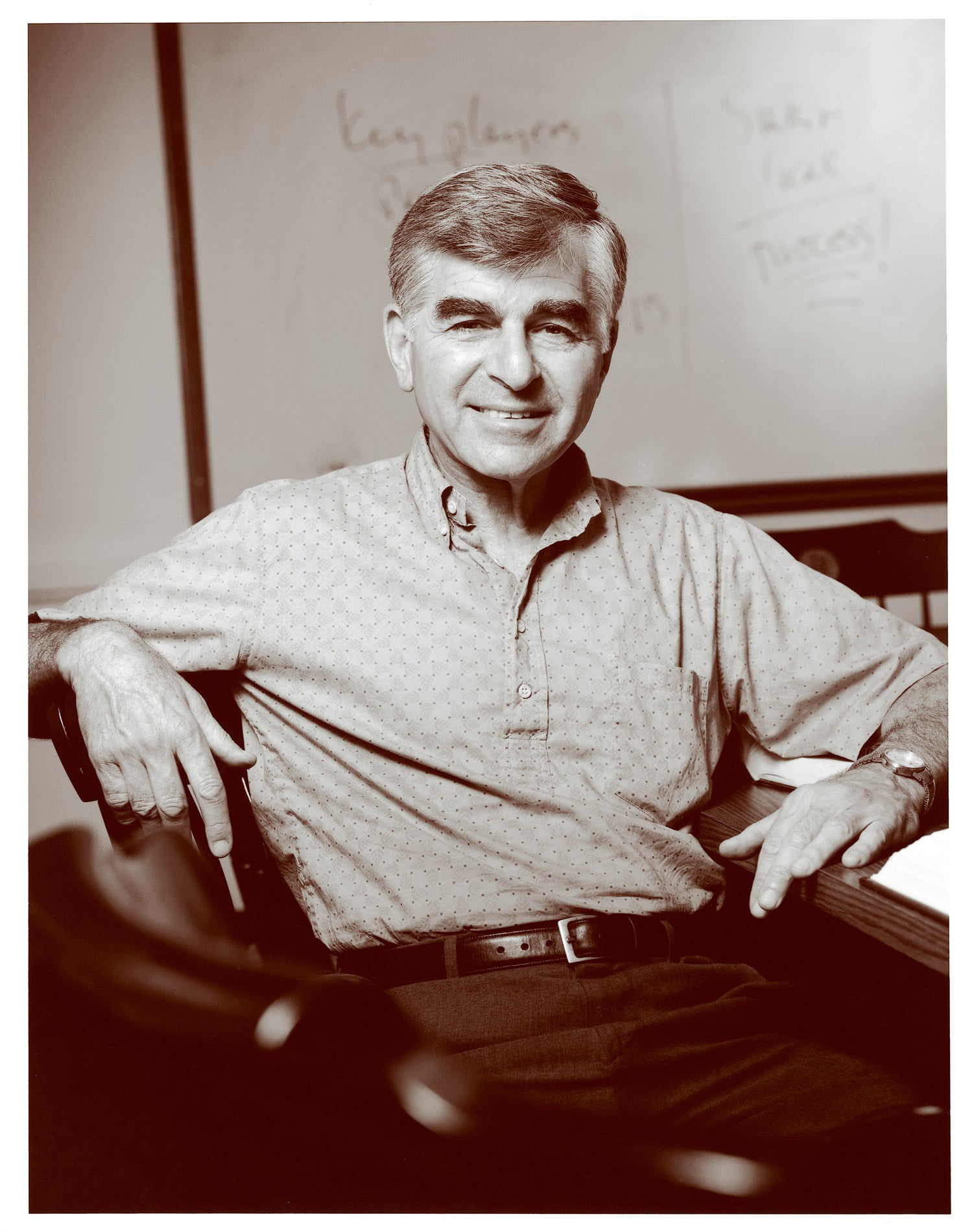When he was an HLS student, Michael Dukakis ran for his first office and was elected a member of the Brookline, Mass., Town Meeting. Much has changed for him since then, but some things have stayed the same. He still lives in Brookline. And he still believes that government at any level can help people. It’s a belief he wants to ingrain in his students, to whom he devotes the same energy he did to the governor’s job. In fact, he has to say goodbye–his students are at the door.
“Once you’re a governor, you’re always a governor in some ways.”
“The concern you always have if you’re somebody like me who’s coming to teaching from what I was doing is that you’re going to intimidate your students, they’re not going to challenge you, they think you know everything, which of course you don’t. If I did, I’d have become the president of the United States.”
“Despite all the crap that they listen to and watch through the media, the fact of the matter is that we’re still producing lots and lots of young people who want to do public service.”
“I do everything I can to dissuade [students] from going to law school unless they really want to practice law. There’s this kind of myth out there that if you want to do public service, you’ve got to have a law degree. And of course that’s nonsense.”
“Joe McCarthy was a strong motivating force. I couldn’t stand the guy.”
“It was inconceivable–it was 1962 and I got elected to the Legislature–that a Greek-American could be elected governor in this state. And it wasn’t because of any anti-Greek prejudice; it just wasn’t in the ethnic cards.”
“We changed things. I think we really did. This state, when I was elected to the Legislature in 1962, was one of the three or four most corrupt states in the country. I kid you not; it was terrible.”
“If there’s one thing I teach, it’s that good people working together can make a huge difference in this world.”
“You can’t ‘what if’ your way through the rest of your life.”
“If you ask people, they’ll tell you I was a much better governor the second time around. And I think part of it was the loss [for reelection in 1978]. When I came back, I was a much better coalition builder; I was a much better listener; I had a much better relationship with the Legislature. Those are the kinds of things that defeat teaches you. I don’t recommend it as a permanent condition, needless to say.”
“It’s not that state governments have not got a major role to play here–they do. But they cannot affect the overall condition of the national economy, and that’s what you’ve got to be prepared for, and you’ve got to try to protect yourself against it.”
“We had standards for integrity in this state that I think were long overdue and at least began to give the citizens of the commonwealth a sense–whether they agreed with us or not on specific policies–that competent, honest people were running the government.”
“If I had become president? I think there’d be peace in the Middle East. I’d like to think we would have universal health care in this country. We’d certainly have a national rail passenger system that would knock your socks off.”
“I said it’s about competence, not ideology. It’s about values. That was the next line that nobody quotes.”
“Once you’re running for the presidency and you look as if you’re going to be a credible candidate, a thousand reporters want to interview you, and they all want to psychoanalyze you. You know, ‘Who is the real Mike Dukakis? There must be more to this guy.’ And I say to them, ‘Look, what you see is what you get.’ I mean, that’s me.”
“I don’t see how this country can have the kind of future that we want for ourselves unless we invest a modest but consistent amount of money in a first-class high-speed rail system. We’re putzing along at 70 miles an hour [on the train] everywhere outside of the Northeast. I mean, this is ridiculous.”
“I’m not interested in the trappings of office. I don’t need a hell of a lot to live.”
“We’re all volunteers. Nobody forces you to do this kind of thing. I’ve had an incredible life. You know, my parents came over on the boat. And their kid became governor and his party’s nominee for the presidency. It’s really an extra-ordinary opportunity that one has in this country in what has to be the most open political system in the world.”
“It makes life a lot simpler if your public and private personas just happen to be the same thing.”
